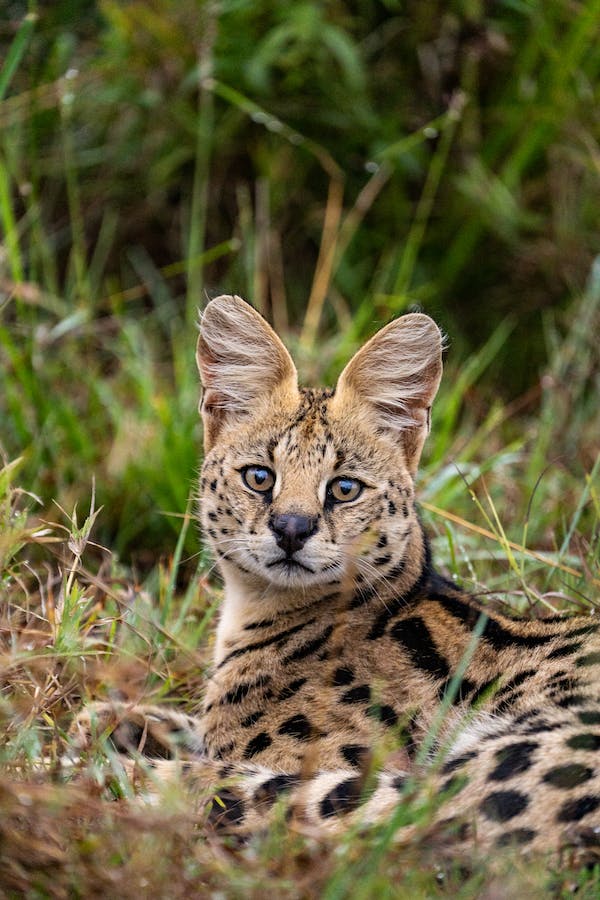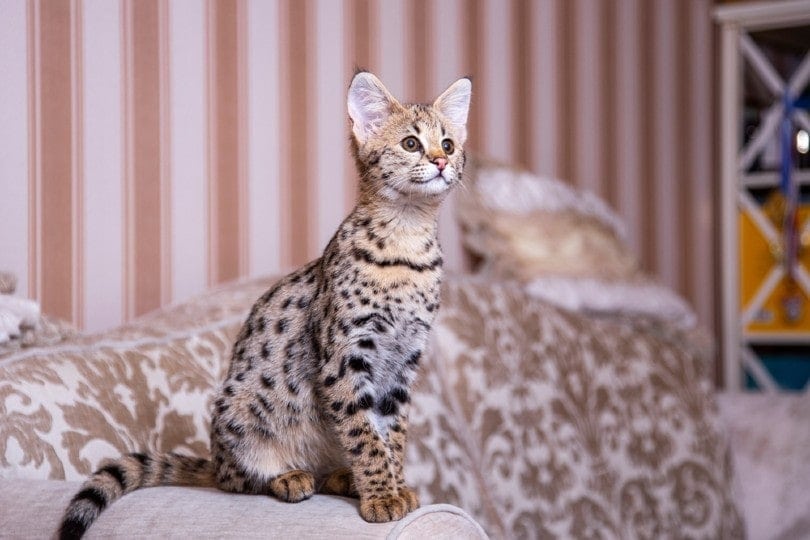The Serval cat or African Serval is one of the medium-sized wild cats native to Africa. In most African countries, the Serval cat is commonly called a "bush cat." But in South Africa, the Serval cat is called "tierboskat," meaning "tiger bush cat" in Afrikaans, one of the eleven official languages of South Africa. On the IUCN Red List, African Serval cats are listed as "least concern," meaning they are not critically endangered, endangered, vulnerable or near threatened. In this article, you will discover some information and facts about the Serval cat.
Physical Characteristics Of The Serval Cat
The Serval cat is a medium-sized wild cat characterized by a slender body, huge ears, extra-long legs, a stretched-out neck, and a small head. It has a black-tipped tail that is around 12 inches long and a spotted and striped coat that is basically golden-yellow. However, there have been two known white Serval cats, Tonga and his brother Pharaoh, that lived at Big Cat Rescue in Tampa, Florida. Pharaoh Serval was put down at the age of 21 after the last round of drugs and supportive care failed.
Full-grown Serval cats measure up to 39 inches in head-and-body length, with males being sturdier than females, and weigh up to 40 pounds, with females being lighter than males.
Habitat and Distribution
Serval cats inhabit grasslands, moorlands, and bamboo thickets and are found in several African countries including Kenya, South Africa, Botswana, Namibia, Morocco, Tunisia, and Zambia. In the wild in Africa, Serval cats prefer areas close to water bodies such as wetlands and savanna, where tall grass and bushes camouflage them.
Serval Cat Behavior in The Wild
In the wild, Serval cats start their activities around twilight and rest in the shade of bushes and grasses to groom themselves for some hours before resuming activities. They are active both during the day and at night. Serval cats walk as much as two and a half miles every night, using special trails to reach certain hunting areas. As solitary animals, African Servals don't leave in groups, except during the mating season, when a male and a female Serval cat may stay together. Serval kittens leave their mother when they are about a year old.
Serval cats use urine and saliva to scent mark their ranges and preferred paths. They have been nicknamed "jumping cats," because of their ability to leap 1–4 meters horizontally and 3.5 meters vertically. They are also able to climb efficiently but not frequently. Like many cats, serval cats are able to meow, hiss, purr, grunt, and growl.
Prey and Predators
In the wild, the Serval cat usually preys on African vlei rats, also known as groove-toothed rats, insects, frogs, hares, African grass rats, African pygmy mice, and small birds. A serval cat can jump more than nine feet straight up to incredibly grab a bird right out of the air! The serval cat's diet consists of 80–97% rodents. While eating a rat or a mouse, Serval cats usually get rid of the rodents' internal organs. They typically pluck feathers from birds before eating them.
The Serval cat's predators include leopards, wild dogs, hyenas, and humans. To escape a predator, a Serval cat will swiftly flee in long leaps, with its tail raised, while frequently changing its direction. Known as one of the top five fastest cats in the world, the Serval cat can reach speeds up to 45 miles per hour. The Serval cat's incredible speeds help them escape from predators.
Serval Cat Lifespan
Serval cats have an average lifespan of 20 years in captivity and ten years in the wild. The oldest captive Serval cat on record lived to be 23 years.
Serval Cat Price
The Serval cat is one of the most expensive felines in the world. The prices of Serval cats in the United States range from $3,000 to $10,000 depending on several factors including, age, sex, color, and the breeder. In the United Kingdom, acquiring a serval cat will cost you between £750 and £12,000 depending on the sex and breeder.
Can You Keep a Serval Cat as a Pet?
Of all of the exotic cat species, the Serval cat is the best hunter, being successful in half of its hunting attempts. For this reason, this large, active, and independent feline does not make a good house pet. Moreover, Serval cats are escape artists and carnivores and therefore need large, fully enclosed outdoor spaces, and a specific diet of mostly raw meat.
A pet Serval cat may be suitable for someone who has the money, time, space, and energy to care for it. Even though they can be affectionate and normally do not act aggressively toward humans, Serval cats are not to be kept with other pets or with little children.
In the United States, it is legal to own a Serval cat as a pet in a few states including Alabama, Michigan, Nevada, North Carolina, South Carolina, Tennessee, Washington, and Wisconsin. In the United Kingdom, Serval cats are classified as "Dangerous Wild Animals," which requires a license to keep as pets. See the "Top 8 Legal Exotic Cats in The UK." With a permit, you may own a Serval cat as a pet in some parts of Canada.
Serval Cat Hybrid
In April 1986, a US breeder crossed a male African serval cat with a female domestic cat to produce the F1 Savannah cat. This makes the F1 Savannah cat half wild and half domestic. The F2 Savannah cat, which is considered 30% percent wild, is a hybrid between an F1 Savannah cat and a domestic cat. There are up to eight filial generations of Savannah cats. The Savannah cat is larger than the typical domestic cat and resembles its father in its coat pattern and apparently inherited a few domestic cat traits, such as tameness, from its mother.
Over the years, Savannah cats have gained popularity as pets in the United States, United Kingdom, Canada, and other countries around the world. In the United States, it is currently illegal to own a Savannah cat in the states of Georgia, Hawaii, Nebraska, and Rhode Island. For more info, see "Savannah Cat Legal and Illegal States."
In the United Kingdom, a license is required to keep an F1 Savannah cat as a pet. In Canada, Savannah cats are legal to keep as pets in every province. However, some provinces restrict the ownership of F1 and F2 Savannah cats as pets. For more information, see "Legal Exotic Pets in Canada."
The Savannah cat is the most expensive cat in the world, with a price range of $1,000 to $20,000 in the United States, £800 to £16,000 in the United Kingdom, and $1400 to $25,000 in Canada.








